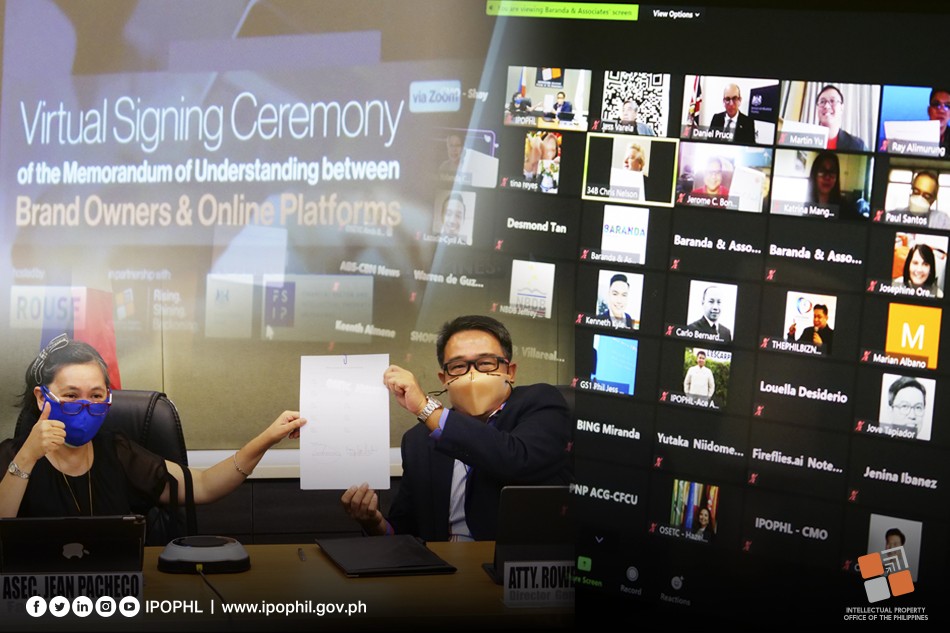
Lazada, Shopee and IP right holders band together in fight vs. rising online counterfeiting, piracy
March 2, 2021
To help address the rise of online counterfeiting and piracy, e-commerce platforms Lazada and Shopee signed on March 1, 2021 a memorandum of understanding (MoU) with several global and local brand owners and business associations to build a stronger industry-wide coordination mechanism.
On the part of brand owners and their representatives, companies who signed are Unilever Philippines, Inc., GlaxoSmithKline Consumer Healthcare Philippines, Inc., GlaxoSmithKline Philippines, Inc., Globe Telecom, Inc., Castrol Ltd., Solar Pictures, Inc., the Philippine Retailers Association, and the American Chamber of Commerce of the Philippines.
“This MoU establishes a code of practice among online marketplaces, as well as an efficient notice and takedown procedure, to intensify our fight against the sale of counterfeit and pirated goods over the internet. This is especially crucial with counterfeit and piracy complaints and reports surging to a record-high last year,” IPOPHL Director General Rowel S. Barba said.
In 2020, when the COVID-19 lockdown compelled a massive shift to e-commerce, IPOPHL received 121 reports and complaints, the highest since the establishment of the IP Rights Enforcement Office in 2013. About 90% of the total alleged violations were said to be conducted online.
“With harmonized procedures and deeper ties with platforms, IP right holders are better able to notify e-commerce and request for swift actions necessary to prevent counterfeiters and copyright pirates from making a sale,” Barba added.
Under the MoU, Lazada and Shopee commit to deal with notifications in “a time-efficient and comprehensive manner.” Seeing the MOU as a way to strengthen their commitment to protect their consumers and IP rights owners, both platforms also commit to ensure that their processes in validating complaints “will not lead to an unreasonable or undue delay” in the removal of the notified ad, post or offer, with platforms having the option to implement other deterrent measures against the infringers.
For their part, brand owners commit to use the notice and takedown system established by online platforms and to take commercially reasonable steps to effectively fight counterfeiting at its source.
The MoU is a result of IPOPHL’s collaboration with the British Embassy under the UK Prosperity Fund ASEAN Economic Reform Programme.
“This e-commerce MOU, which serves as an industry-wide online code of conduct, is a notable culmination of the strong commitment from both government and industry stakeholders to the promotion and protection of IP rights in the country, particularly in the online domain,” UK Ambassador to the Philippines Daniel Pruce said.
“Through our Prosperity Fund ASEAN Economic Reform programme, the UK is a proud partner of this initiative – one of the first in the region – to enable a transparent, efficient and secure e-commerce community made all the more relevant in the current Covid-19 economic recovery," Pruce added.
Consulting firm UK Rouse, through its Philippine partner Baranda & Associates was tapped to provide technical guidance in the crafting of the MoU.
The initiative is inspired from the MoU which was signed by global ecommerce platforms, associations, and brand owners in Brussels in 2016 and has since been used to address online counterfeit in Europe.
Recognizing intermediaries’ roles
Barba also described the MoU as a “commendable first-step” as it signifies agreement among various sectors on the important role intermediaries have in eliminating vulnerabilities in the supply chain.
Intermediaries, such as malls, payment gateways and internet service providers, are third parties that offer services and/or infrastructure that may be used to complete an illegal sale without the intermediaries’ knowledge. Intermediaries are not accountable for such, however, there is a growing legal push across various countries, including the Philippines, to set a legal framework that will hold them liable.
Under Senate Bill 1591 or the proposed Internet Transactions Act, the Department of Trade and Industry (DTI)––IPOPHL’s mother agency––is seeking regulatory powers to take down websites or issue cease-and-desist orders to platforms facilitating the sale of illegal or dangerous products.
DTI Assistant Secretary and the country’s E-Commerce Lead Jean T. Pacheco lauded the platforms and brand owners for working together to address challenges in the e-commerce environment.
“It is truly an urgent matter to create efficient redress mechanisms to ensure that consumers are protected while businesses, particularly MSMEs, thrive through e-commerce,” Pacheco said.
She added that the MoU signifies a strong holistic effort to build trust in the digital environment, helping the country attain its goal for e-commerce to contribute P1.2 trillion or 5.5% to GDP by 2022.
“This MoU is a very good start in bringing consumer and business confidence within the e-commerce environment. This initiative can even be a model partnership that other players in the e-commerce ecosystem could emulate. I hope we maintain this harmony and continuously accelerate the growth we want to achieve for e-commerce,” the DTI official added.### (Janina Lim, Media Relations Officer)








